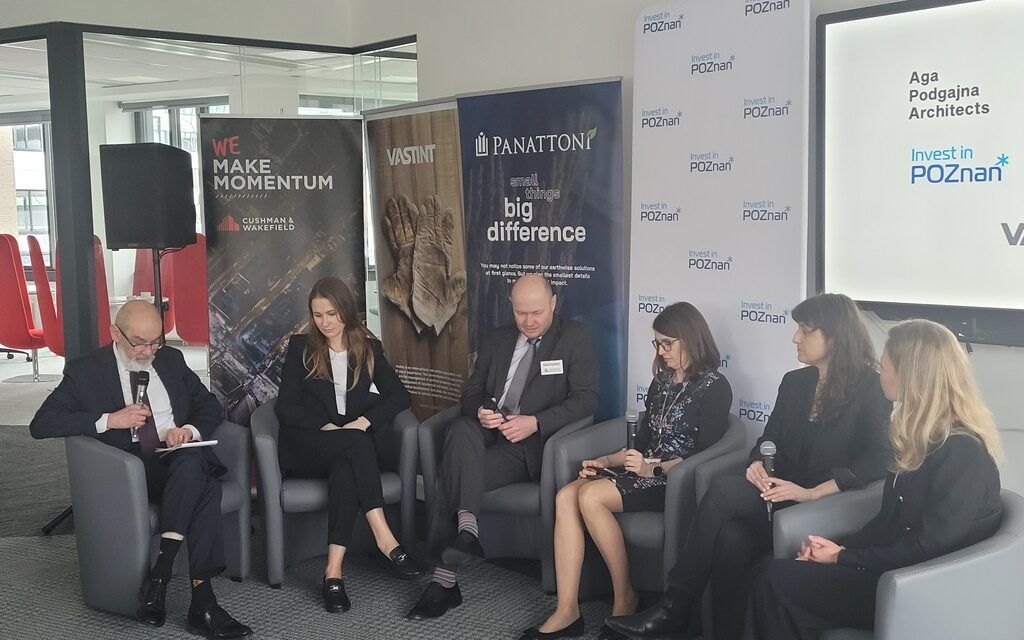This local expert meeting was intended to show the directions of development of the commercial real estate market (office and warehouse market) in Poznań and Wielkopolska over the past two years, as well as trends and forecasts for 2023. It also considered the importance of public-private dialogue in the shaping of the future development of the city.
The office market is still at a crossroads, without a clear-cut tendency of which way it will develop in future years; the industrial market for factories and warehouses, however, is doing well with low vacancy rates and rising rents.
The office market is adjusting to the long-term effects of the pandemic, Russia’s full-scale invasion of in Ukraine and the high costs of building and fitting out of offices, and the future spread of the hybrid work model.
The meeting began with a presentation of Agnieszka Susicka, real-estate investment senior specialist from the City of Poznań, showing the local authority’s plans for further development as new inward investment continues to move into the city. Poznań, a city of over half a million citizens, has a student population of 105,000, with 25,000 graduates a year, said Ms Susicka.
Architect and town planner, Aga Podgajna, based her talk on the challenges facing urban planning on her experiences of working with UK local authorities, stressing the importance of cooperation between the public and private sectors in the sustainable development of cities. She explained the concept of ‘placemaking’ as miastotwórczość – a city in which young people want to live and work, the need for dialogue between employers, employees and local authorities in ensuring the right ingredients in the right places.
Grzegorz Bobrowski, manager of Cushman & Wakefield’s Poznań office outlined the prospects for the Poznań office market in 2023 and beyond, stressing the current uncertainty as a factor that is causing supply and demand to take a pause. By comparing Poznań with other Polish cities, a clearer picture emerged as to how the office market would develop. He said that the actual number of transactions concluded in 2022 exceeded past years’ totals – but that the actual space leased out was less; medium-sized firms that were once looking to rent 1,000m2 were now making do with 400m2, said Mr Bobrowski. Pre-lets had fallen from around 50% in 2020 to 5% in 2022. Magdalena Taciak, negotiator, from Cushman & Wakefields Leasing Agency Industrial department, also gave a comparative presentation using similar methodology, yet showing brighter prospects for the factory and warehouse market, which is still growing briskly in Poznań. Ms Taciak said that companies looking to rent 10,000m2 of logistics space and hire 50 warehouse workers are finding Poznań one-third cheaper than Czechia – and two-thirds cheaper than Germany. She also pointed out that Poznań has as much warehouse space as the whole of Slovakia.
Soaring energy prices were an unwelcome shock for tenants; inflation-based indexation, which had seen service charges rise by around 1% to 1.2% in previous years had now jumped by 11.5%, the audience heard.
After a coffee break, the presenters were joined on stage for a panel discussion by Panattoni’s development director Katarzyna Kujawiak, and Magdalena Makuch, leasing manager at the event’s host, Vastint. The panel was moderated by the BPCC’s chief advisor, Michael Dembinski.
Ms Kujawiak said that green building was here to stay, driven primarily by banks and other financing institutions who wanted to minimise the carbon footprint of the investments in which their money was involved; this was leading to a big step-change in the quality of logistics space in Poland. Ms Makuch spoke about the importance of office fit-outs when it came to making an office an attractive place for employees to come and work. She also discussed, as did Mr Bobrowski, the supply and demand of flexible office and co-working spaces in the Poznań market. Properties designated for this type of use are currently highly sought after as an answer to future uncertainty.
Grzegorz Bobrowski said that as AI systems such as ChatGPT become a commonplace part of business life and companies start seeing real productivity gains, being able to do more with a small staff, the first people likely to lose employment are those least often seen in their office – home-office workers will be most vulnerable, not being perceived as part of the team. Magdalena Taciak explained how last-mile logistics was changing city-centre landscapes. Data centres are a relatively new property class, which on the one hand need first-class access to the energy grid, and yet are not well-suited to typically urban locations.
There was time for networking after the panel, which participants made maximum use of.


































